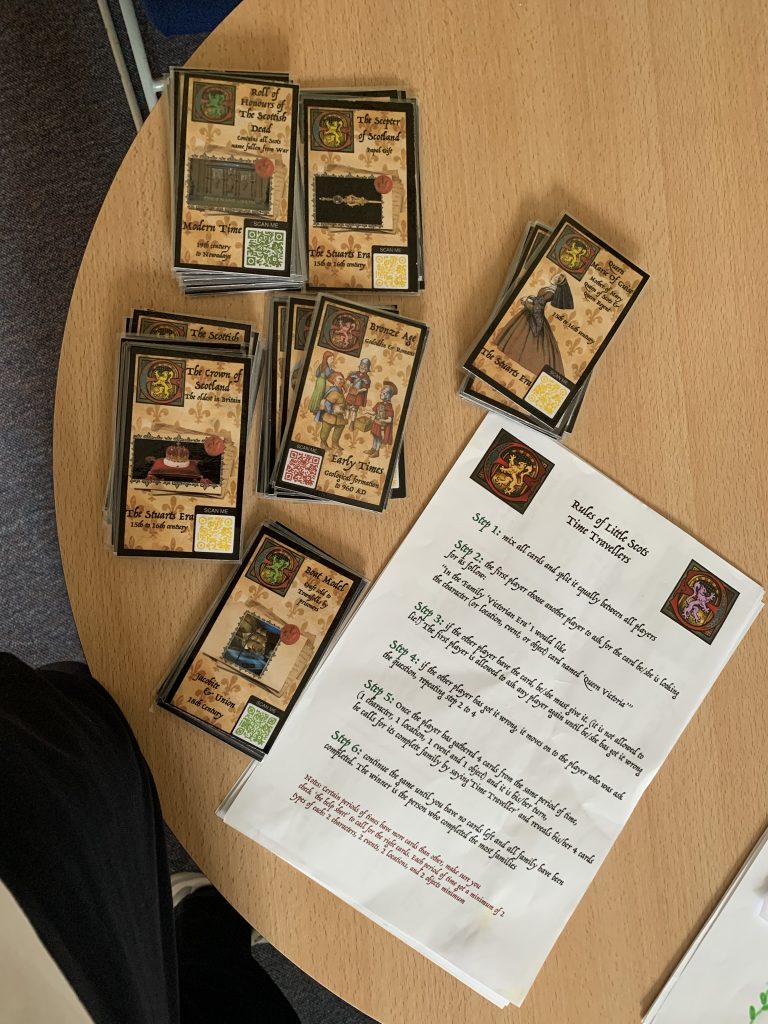2022: Lothian Learners Project – ‘Little Scots Time Travellers’.
Supported by Heriot-Watt Engage, the Lothian Learners Project aimed to co-create visual and engaging materials which align with the Curriculum for Excellence. Drawing from his PhD research in heritage and interpretation, IRC PhD student Marc Romano produced engaging educational material for primary 5-6 pupils in the West Lothian area as well as West Lothian Libraries.
Marc introduced the future generation into topics of Scottish cultural heritage and history via the design of a card game called ‘Little Scots Time Travellers’. The addition of a QR code to traditional cards made the game interactive for the younger generation, who were able to learn and explore many resources from Historic Environment Scotland‘s own 3D models, historical facts and videos. The game itself is centred around building up the Edinburgh Castle’s own historical timeline from first settlers to contemporary times. The end results proved to be very successful for the children exploring and connecting with their own heritage and becoming ‘Little Scots Time Travellers’ themselves.

“Community Placemaking” through Heritage Work
Impact case study submitted for the Research Excellence Framework (REF) 2021 – Unit of Assessment D25 – Area Studies
Connections between people and place can be disrupted by historical divisions, incomers/migrants. Research at the Intercultural Research Centre (IRC) addressed the concept of placemaking in international locations. Lessons learned from international case-studies had impact in three distinct UK places (rural, urban and island): Lough Neagh (Northern Ireland), the Northern Isles (Orkney/Shetland) and Leith Late (Edinburgh city). IRC research has rejuvenated a sense of belonging among local groups through archaeology, community mapping, workshops, and the co-creation of cultural heritage work. These activities have rejuvenated community relations between Protestants and Catholics (LN), migrants and incomers (NI), artists, tourists, and local communities (LL).
https://results2021.ref.ac.uk/impact/d292cf2d-0773-4452-8515-5b0e0752bdb4?page=1

Mobile Virtual Learning for Indigenous Languages and Cultures
2019 was proclaimed as the International Year of Indigenous Languages (UN Resolution 71178 on the Rights of Indigenous People) and the UN declared 2022 -2032 as the International Decade of Indigenous Languages, “to draw attention to the critical status of many Indigenous languages across the world and encourage action for their preservation, revitalization and promotion” (UN website). In this context, the EU-funded IndyLan project, led by Heriot-Watt, designed an app for the promotion of indigenous languages and the cultures of their speakers in 4 European countries. The IndyLan application helps speakers of English, Spanish, Norwegian, Swedish and Finnish to learn Gàidhlig (Gaelic), Scots, Kernewek (Cornish), Euskera (Basque), Galego (Galician) and Davvisámegiela (Northern Saami), all endangered at different degrees.
The immediate geographical impact of the project is wide ranging. Thanks to this, the impact of the project extended to the European level and beyond, with more than 5,000 app downloads from all over the world (Top countries: UK, USA, Spain, Finland and Australia). The fact that USA was the second country and Australia the fifth demonstrates the international relevance of the app and of the project, beyond the European focus, as well as its potential for further exploitation and follow-on projects.
There was considerable interest from individuals, companies, stakeholders focusing on other endangered languages such as Jèrriais or Occitan, who contacted the coordinator to explore opportunities for further collaboration and add more languages. The fact that the majority of users who gave feedback and engaged with the project and the app were younger people is very encouraging. This was confirmed by user who stated in the final dissemination event feedback form: “It seems to appeal to young people, which is critically important for threatened languages to survive”. Through the development of the app material and through contact with project partners who speak some of these languages, participants enriched their awareness of linguistic diversity in Europe and heightened their intercultural competences and perspectives. The project also encouraged new partnerships in follow-on projects. Teachers and trainers acquired knowledge of ICT-based teaching/learning methods so that they can incorporate them into their curricula. For example, computer science teacher at a Gaelic-medium school in Glasgow Coinneach Combe assigned mobile app homework for Gaelic-speaking pupils. There has been interest in the app by organisations such as Bòrd na Gàidhlig and ELEN (European Language Equality Network) and we are currently liaising with them as to how we can follow-on from this project.
Saved by the App? Article in The Linguist on the IndyLan project.
Please contact the project coordinator Dr Katerina Strani if you wish to read the project’s Impact report.
You can download the app on iOS or on Android here
New Connections Across the Northern Isles 2019
Click on this link to visit our Virtual Museum on Maritime Heritage !
Moving Languages
The Moving Languages project, led by Learnmera Oy in Finland, with Heriot-Watt as a partner (Co-I Strani), designed a mobile application for the linguistic and cultural inclusion of newly arrived migrants and refugees.
Linguistic isolation is one of the key barriers to the inclusion of migrants in host societies (cf Strang 2014). Mobile applications are an effective educational source that can be specifically targeted at migrants and refugees, as a considerable percentage of them are digitally literate and own smartphones (cf GSMA, 2017; Dekker et al, 2018; AbouJarour et al, 2017).
There are plenty of generic language-learning apps that are not designed for the needs of refugees or newly-arrived migrants. The Moving Languages app fills this gap with features such as : Targeted support languages (26 in total), Culture tab, Administration and Immigration tabs.
Users can learn English, Spanish, Italian, German, Swedish, Finnish (main languages) from 20 support languages: Albanian, Arabic, Bulgarian, Chinese, Croatian, Estonian, French, Hungarian, Kurdish (Sorani), Polish, Portuguese, Punjabi, Romanian, Russian, Serbian, Somali, Tigrinya, Turkish, Ukrainian, Urdu. The app has been downloaded more than 4,000 times, mostly for Swedish, Finnish, then Italian, then English and German.
You can download the Moving Languages apps here
